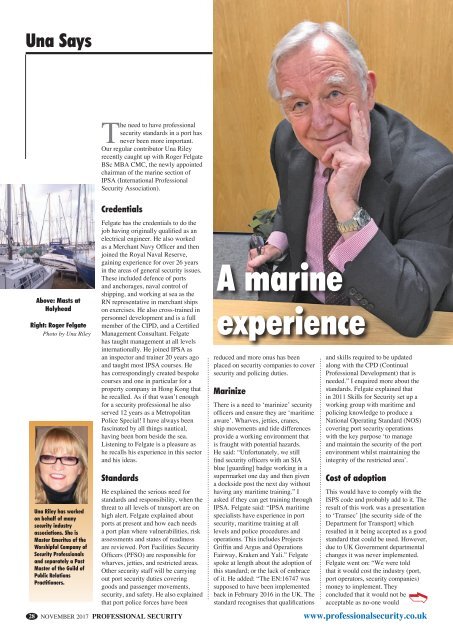27-11draft
You also want an ePaper? Increase the reach of your titles
YUMPU automatically turns print PDFs into web optimized ePapers that Google loves.
Una Says<br />
The need to have professional<br />
security standards in a port has<br />
never been more important.<br />
Our regular contributor Una Riley<br />
recently caught up with Roger Felgate<br />
BSc MBA CMC, the newly appointed<br />
chairman of the marine section of<br />
IPSA (International Professional<br />
Security Association).<br />
28<br />
Above: Masts at<br />
Holyhead<br />
Right: Roger Felgate<br />
Photo by Una Riley<br />
Una Riley has worked<br />
on behalf of many<br />
security industry<br />
associations. She is<br />
Master Emeritus of the<br />
Worshipful Company of<br />
Security Professionals<br />
and separately a Past<br />
Master of the Guild of<br />
Public Relations<br />
Practitioners.<br />
Credentials<br />
Felgate has the credentials to do the<br />
job having originally qualified as an<br />
electrical engineer. He also worked<br />
as a Merchant Navy Officer and then<br />
joined the Royal Naval Reserve,<br />
gaining experience for over 26 years<br />
in the areas of general security issues.<br />
These included defence of ports<br />
and anchorages, naval control of<br />
shipping, and working at sea as the<br />
RN representative in merchant ships<br />
on exercises. He also cross-trained in<br />
personnel development and is a full<br />
member of the CIPD, and a Certified<br />
Management Consultant. Felgate<br />
has taught management at all levels<br />
internationally. He joined IPSA as<br />
an inspector and trainer 20 years ago<br />
and taught most IPSA courses. He<br />
has correspondingly created bespoke<br />
courses and one in particular for a<br />
property company in Hong Kong that<br />
he recalled. As if that wasn’t enough<br />
for a security professional he also<br />
served 12 years as a Metropolitan<br />
Police Special! I have always been<br />
fascinated by all things nautical,<br />
having been born beside the sea.<br />
Listening to Felgate is a pleasure as<br />
he recalls his experience in this sector<br />
and his ideas.<br />
Standards<br />
He explained the serious need for<br />
standards and responsibility, when the<br />
threat to all levels of transport are on<br />
high alert. Felgate explained about<br />
ports at present and how each needs<br />
a port plan where vulnerabilities, risk<br />
assessments and states of readiness<br />
are reviewed. Port Facilities Security<br />
Officers (PFSO) are responsible for<br />
wharves, jetties, and restricted areas.<br />
Other security staff will be carrying<br />
out port security duties covering<br />
goods and passenger movements,<br />
security, and safety. He also explained<br />
that port police forces have been<br />
NOVEMBER 2017 PROFESSIONAL SECURITY<br />
A marine<br />
experience<br />
reduced and more onus has been<br />
placed on security companies to cover<br />
security and policing duties.<br />
Marinize<br />
There is a need to ‘marinize’ security<br />
officers and ensure they are ‘maritime<br />
aware’. Wharves, jetties, cranes,<br />
ship movements and tide differences<br />
provide a working environment that<br />
is fraught with potential hazards.<br />
He said: “Unfortunately, we still<br />
find security officers with an SIA<br />
blue [guarding] badge working in a<br />
supermarket one day and then given<br />
a dockside post the next day without<br />
having any maritime training.” I<br />
asked if they can get training through<br />
IPSA. Felgate said: “IPSA maritime<br />
specialists have experience in port<br />
security, maritime training at all<br />
levels and police procedures and<br />
operations. This includes Projects<br />
Griffin and Argus and Operations<br />
Fairway, Kraken and Yali.” Felgate<br />
spoke at length about the adoption of<br />
this standard; or the lack of embrace<br />
of it. He added: “The EN:16747 was<br />
supposed to have been implemented<br />
back in February 2016 in the UK. The<br />
standard recognises that qualifications<br />
and skills required to be updated<br />
along with the CPD (Continual<br />
Professional Development) that is<br />
needed.” I enquired more about the<br />
standards. Felgate explained that<br />
in 2011 Skills for Security set up a<br />
working group with maritime and<br />
policing knowledge to produce a<br />
National Operating Standard (NOS)<br />
covering port security operations<br />
with the key purpose ‘to manage<br />
and maintain the security of the port<br />
environment whilst maintaining the<br />
integrity of the restricted area’.<br />
Cost of adoption<br />
This would have to comply with the<br />
ISPS code and probably add to it. The<br />
result of this work was a presentation<br />
to ‘Transec’ [the security side of the<br />
Department for Transport] which<br />
resulted in it being accepted as a good<br />
standard that could be used. However,<br />
due to UK Government departmental<br />
changes it was never implemented.<br />
Felgate went on: “We were told<br />
that it would cost the industry (port,<br />
port operators, security companies)<br />
money to implement. They<br />
concluded that it would not be<br />
acceptable as no-one would<br />
➬<br />
www.professionalsecurity.co.uk<br />
p28,9 Una <strong>27</strong>-11.indd 1 12/10/2017 11:22










